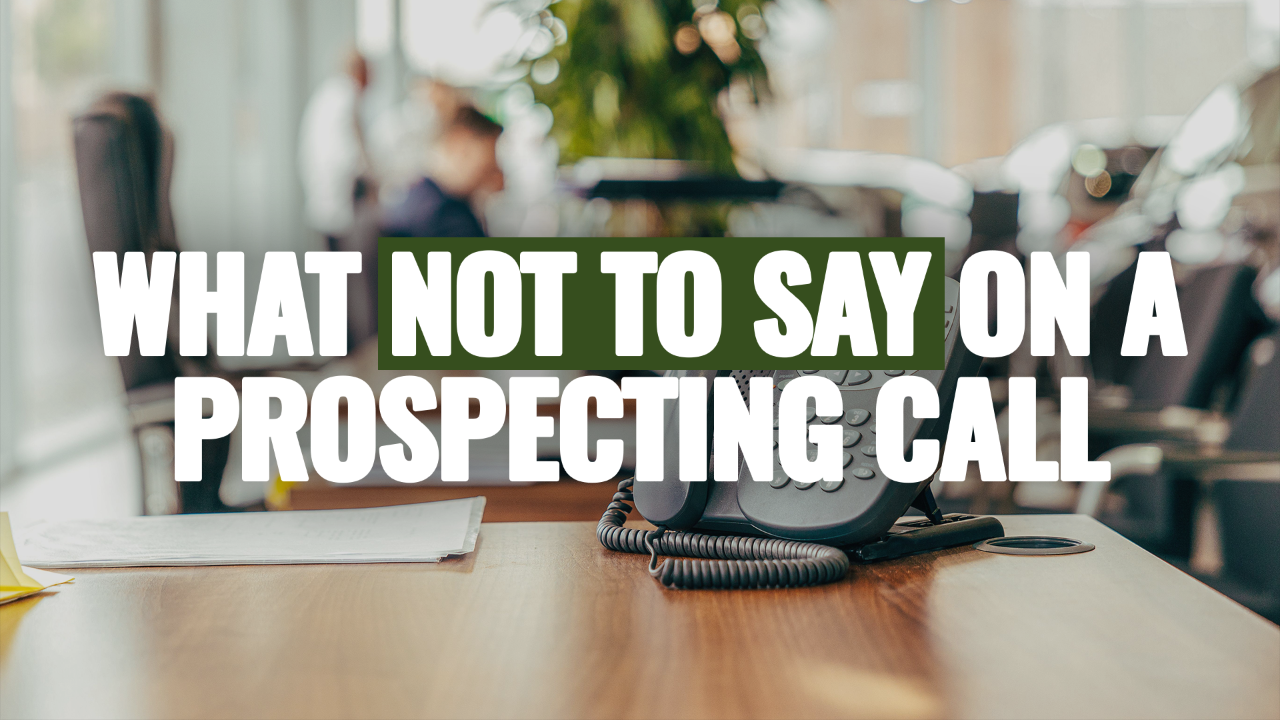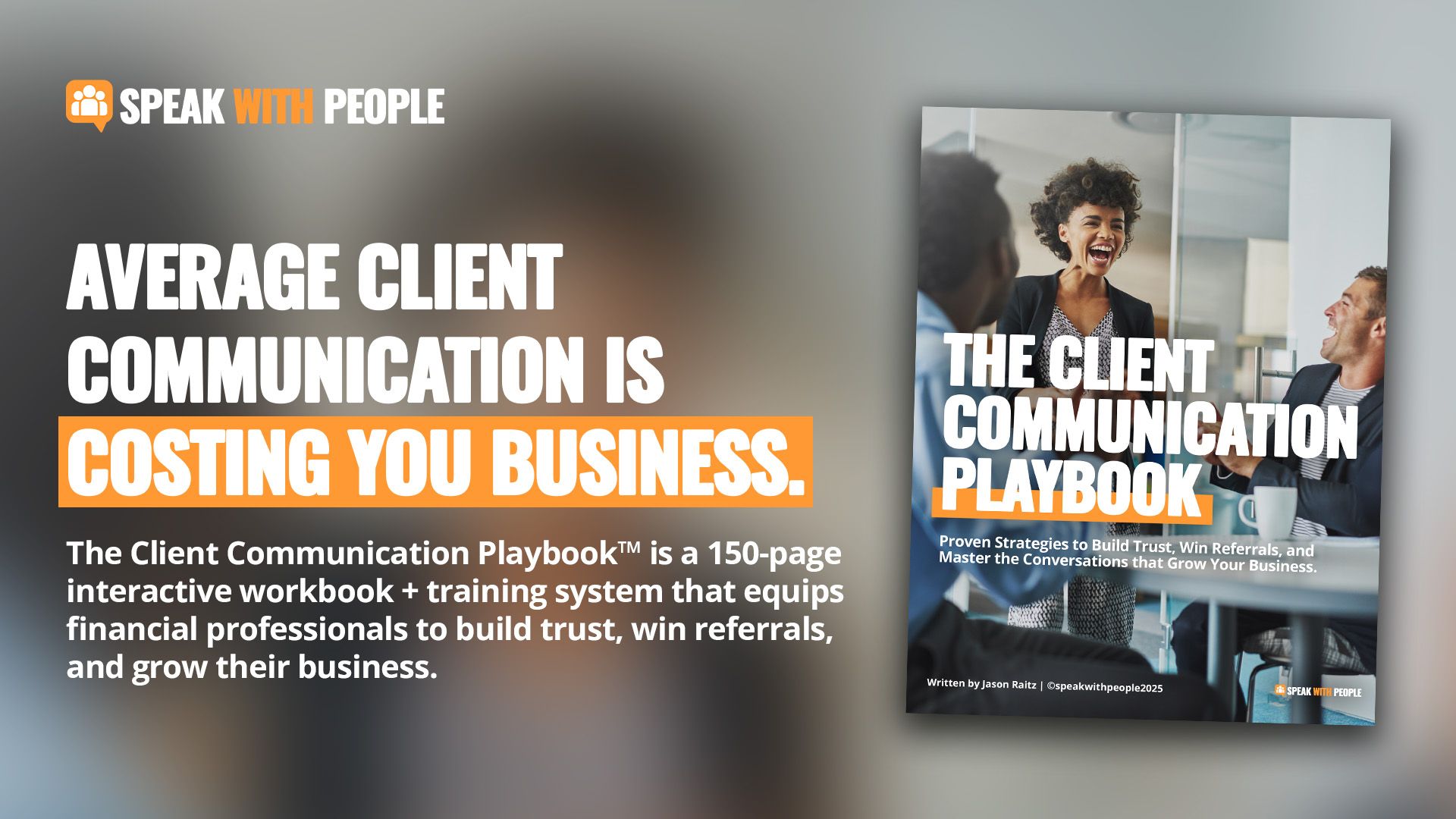The Worst Thing You Can Say on a Prospecting Call (and What to Say Instead)
Jun 05, 2025
When I first launched my business, I was full of energy, passion, and a decent amount of fear. But I was ready to take on the world… or at least the first 12 people on my call list.
So, I picked up the phone, dialed the first number, and—believe it or not—they answered.
What followed was a blur. I rambled. I overexplained. I said “um” too much. And then came their response:
“Okay… not interested.”
Click.
The call was over.
I sat there frozen. One “no” felt like 100. And even though I had 11 more numbers on my list, I didn’t call a single one of them.
Instead, I turned to email. I sent 112 messages to people I had relationships with. Not cold leads—actual acquaintances and colleagues.
Only three people replied.
Three.
I was crushed. Head down. Confidence gone. The thoughts started rolling in fast:
“Maybe I’m bothering people.”
“No one wants this.”
“Why don’t they answer?”
“I must not be good at this.”
I didn’t realize it at the time, but in that moment, I was doing the one thing that sabotages prospecting more than anything else:
I let sarcasm, cynicism, and self-doubt take over.
Prospecting Is Not for the Faint of Heart
If you’re in sales, leadership, or client work—you know this feeling. You make the call. You send the message. You follow up again. And again. And still… nothing.
So what do we do?
We get weird.
We say things on calls we’d never say in person.
We let our fear hijack our tone, our words, our energy.
That’s why I put together this list:
4 Things to Never Say on a Prospecting Call
(And What to Say Instead)
1. “Oh… I didn’t think you’d answer!”
This one might seem innocent—but it’s a major trust killer.
The moment you say it, you’re admitting you weren’t ready for the conversation.
What it actually communicates:
“I was hoping to avoid a real conversation.”
What to say instead:
“Hey [Name], I’m so glad I caught you. Do you have 30 seconds for me to share something I think could really help?”
That shift in tone? It makes you sound prepared, confident, and respectful of their time. You’re not surprised. You’re ready.
2. “Wow… I’ve really gotten to know your voicemail.”
You might think it’s funny, but it almost always comes off as passive-aggressive.
What it actually communicates:
“I’m annoyed you haven’t replied.”
Even if your intent is lighthearted, it puts pressure on the prospect and makes the interaction about you—not them.
What to say instead:
“I’ve been following up because I truly believe this could be valuable for you. I know timing is everything, so I’ll be here when you’re ready.”
That communicates persistence and patience—two of the most underrated sales skills.
3. “I’m sorry to be bothering you…”
This one hurts the most—because I used to say it all the time.
What it actually communicates:
“I don’t believe in the value I’m offering.”
If you’re apologizing before the conversation even starts, you’re telling them it’s not worth their time. You're shrinking your voice before it ever gets heard.
What to say instead:
“I know time is valuable, so I’ll be quick—here’s why I’m reaching out…”
Lead with purpose. Lead with clarity. People don’t want an apology—they want relevance.
4. “Why don’t you ever answer?!”
I’ve never actually said this out loud (thankfully), but I’ve definitely thought it.
And that’s the point.
What it actually communicates:
Desperation. Frustration. Neediness.
If you’ve ever written a follow-up email that starts with, “Not sure if you’ve seen my last 5 emails…” then you’ve been here.
What to say instead:
“Just wanted to stay on your radar—this might not be the right time, but I’d love to connect when it is.”
It keeps the door open without guilt, pressure, or begging.
Why Your Words Matter More Than You Think
When you speak with sarcasm, defeat, or manipulation, you’re actually pushing the person away from a future yes.
But when you speak with someone—when you lead with clarity, empathy, and confidence—you plant a seed.
And sometimes that seed needs time.
Some of the best opportunities I’ve had came from calls and emails I thought were dead ends.
One person didn’t reply for eight months. Another one said no three times before finally saying yes. One prospect replied years later with, “Hey—I remembered you and your message stuck with me.”
That’s the power of planting a seed with purpose. Even when it feels like it’s falling on deaf ears, you never know what it could become.
3 Prospecting Truths to Remember
As you keep dialing and emailing and following up, remember:
1. You’re not an interruption—you’re a potential solution.
Stop apologizing for showing up. If what you offer helps people, then it’s not a nuisance—it’s a gift.
2. It’s not about one conversation—it’s about consistency.
Very few people say yes on the first call. Or the second. Or the third.
But they remember your tone. Your attitude. Your message. Stay visible and stay kind.
3. Confidence is contagious—and so is cynicism.
The more you believe in what you’re doing, the more others will too.
If you let sarcasm or negativity creep in, people can hear it… and it instantly damages trust.
Final Word: Prospect with Humility and Boldness
You don’t need to be cheesy or robotic.
You just need to be clear, human, and helpful.
That’s what speaking with people looks like—even in prospecting.
So the next time you pick up the phone or send that follow-up email, remember this:
👉 Your words either build trust or break it.
👉 The prospect may not say yes now—but they might later.
👉 What you say—and how you say it—matters.
Keep planting seeds.
Keep showing up.
And don’t ever say “Oh no, you actually answered!” again. 😄
Want to become a more confident, clear communicator who actually connects?
Check out our free communication tools and trainings at www.speakwithpeople.com — because how you say it… changes everything.
By Jason Raitz - CEO, Speak with People With over 25 years of experience, Jason has spoken from stages across the country, inspiring and motivating his audiences with stories, laughter, and practical tools to succeed. Book Jason for your next conference or workshop.

